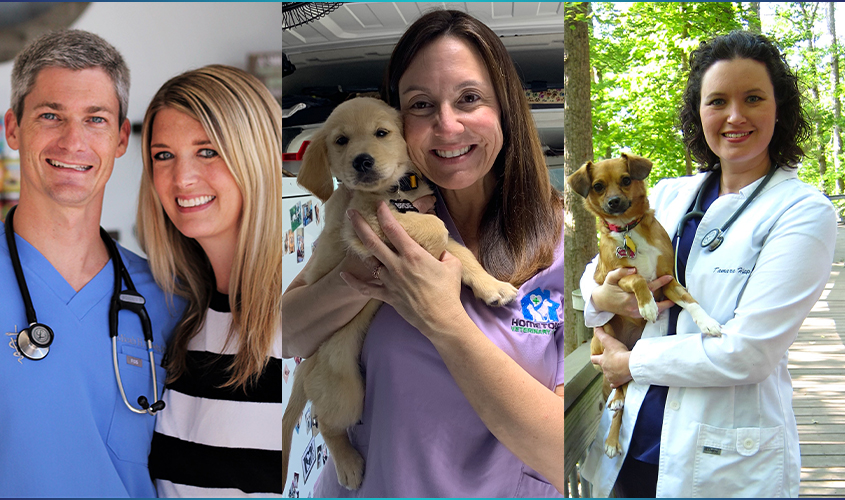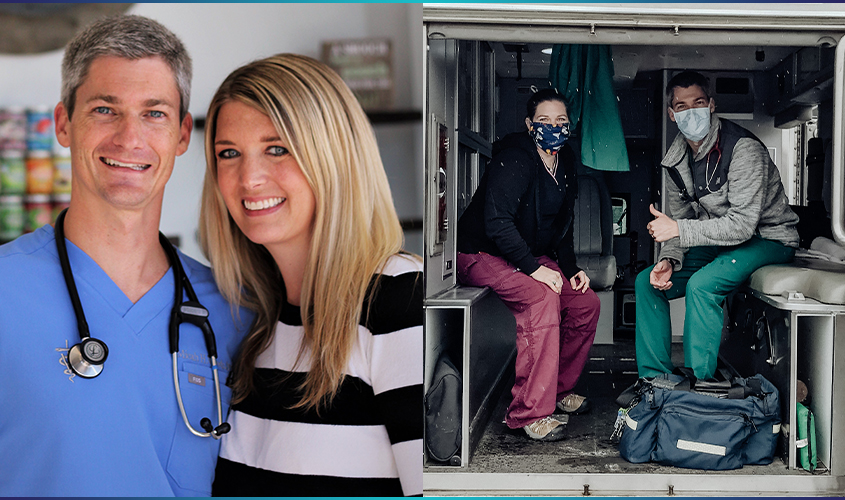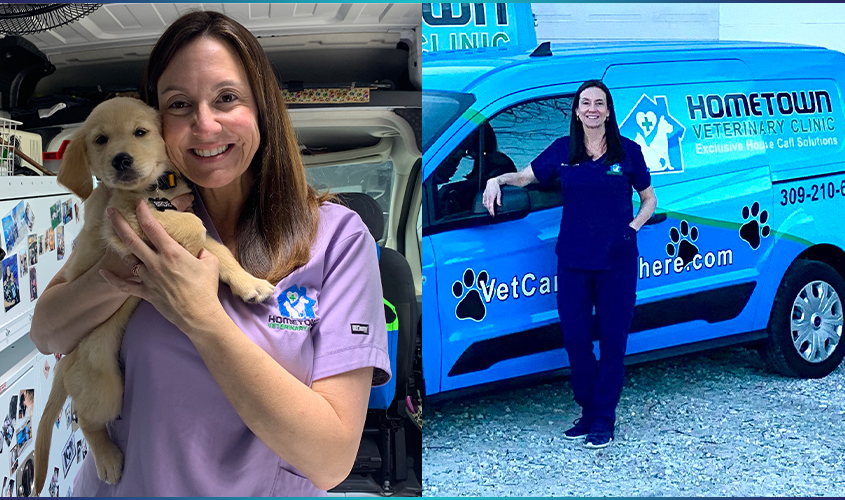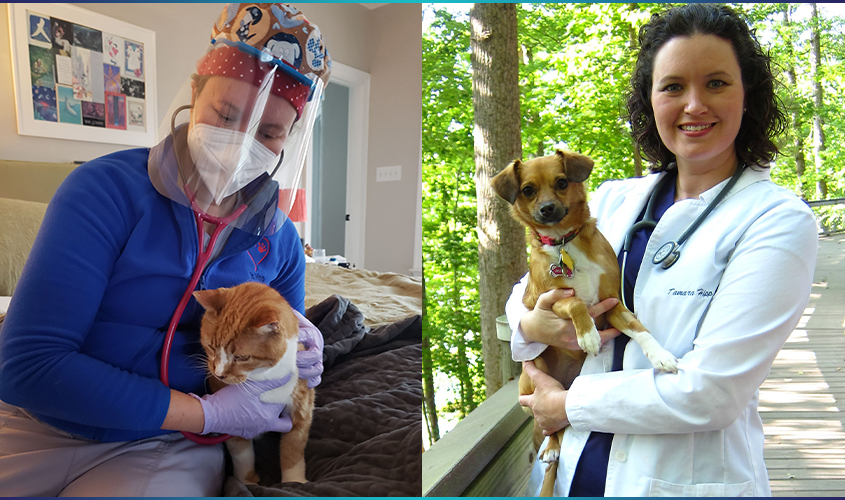3 SVM Grads Doing Mobile Vet Medicine

The COVID-19 pandemic has put mobile veterinary clinics in the spotlight. Veterinarians who are practicing in this fashion are busier than ever as plenty of new pet owners take the plunge in adopting a companion animal to care for while they stay at home. In the pandemic environment, pet owners, especially those who are immuno-compromised, are also reluctant to leave the house to take their pets to more traditional clinics for care. The convenience that offering these services is appealing to many clients.
This niche area of veterinary medicine offers many benefits to the veterinarian as well, including:
- less stressed animals for more precise examinations;
- a more accurate picture of the pet’s home environment;
- flexibility for the vet, including the ability to make your own schedule and control the type of appointments accepted; and
- more access and more time spent with clients to foster doctor-client relationships.
So, what is it like to work as a mobile veterinarian? SGU News spoke with three St. George’s University School of Veterinary Medicine graduates to learn about their experiences doing this type of medicine. Even with the extra precautions they say they take to protect themselves from COVID—these vets are loving every minute of it.

Micah Woods, DVM ’12
Ooltewah Veterinary Hospital
Chattanooga, TN
Micah Woods, DVM ’12, and his wife, Karla, opened their own veterinary hospital in October 2019. The COVID-19 pandemic sped up their plans to eventually offer ambulatory services to their community. Instead, they now initiate house calls with a fully functional ambulance where clients can stay safely in their homes and their pets are returned to them after their procedures. Ooltewah Veterinary Hospital is one of the only veterinary facilities in the region that also serves a variety of exotic animals ranging from pocket pets and reptiles to birds and zoological animals.
“By being mobile, our facility has unlimited access to the community to serve their needs however it is required,” Dr. Woods said. “This also enables us to reach those who otherwise might not have chosen our group to provide their care.
Through a fully functional ambulance, Dr. Woods and his team are able to offer wellness/vaccination visits, sick animal visits, in-home euthanasia, medical therapies for ill animals and medication dispensing as needed. Additionally, the team has the capability to perform general anesthesia for minor surgical procedures as well as basic bloodwork and laboratory diagnostics. Dr. Woods and his team at Ooltewah Veterinary Hospital were recently named “Best of the Best” veterinarian in Chattanooga.
“As veterinary medicine continues to evolve, the focus for all veterinarians should be on service and how they can differentiate themselves from their competition—how they can best reach current and future clients, meet their needs, and exceed their expectations. As more and more people move to working remotely, mobile veterinary practices will become more and more common,” Dr. Woods said.

Kim Springman, DVM ’10
Hometown Veterinary Clinic
Peoria, IL
A typical trip to the vet can be stressful for both pet owners and their beloved animals. Kim Springman, DVM ’10, owner of Hometown Veterinary Clinic, addresses those concerns with her mobile operation.
With the ability to examine, diagnose, and treat at client’s doorsteps, “mobile veterinary care eliminates the need for car rides with anxious pets, so we get a more accurate examination,” Dr. Springman said. “It also eliminates the clients from having to leave home. Many of our clients are elderly with compromised immune systems. Having veterinary care at their doorstep allows their pets to get the care they need.”
For Dr. Springman, having a mobile practice allows flexibility and get a complete picture of the pet’s home environment, which allows better care for the animals.
“I feel like every day is an adventure. I love seeing the differences in the way people live,” she said.
Dr. Springman’s bet on mobile medicine is paying off. Earlier this year, she added a second mobile vet truck and recently purchased a third truck to be used for mobile grooming. Furthermore, a local newspaper awarded Hometown Veterinary Clinic as her community’s pick for best veterinary clinic for the last three consecutive years.
“We are busier than ever as our clientele has grown to capacity,” she said. Mobile veterinary medicine is “the future of veterinary medicine. With the advent of online ordering, grocery delivery, and restaurant curbside pickup, people want a more personalized, convenient service.”

Tamara Hipp, DVM ’12
Twilight Meadows Mobile Veterinary Services
Raleigh, NC
Dr. Tamara Hipp, DVM ’12, originally started her mobile business, Twilight Meadows Mobile Veterinary Services, to perform end-of-life services for cats and dogs in their homes. However, she enjoyed doing home visits so much she expanded her offerings to include preventative care and minor illness needs, treating the most commonly seen non-emergency illnesses, including ear infections, skin issues, minor injuries, and urinary tract infections, for example.
Being able to make her own schedule and control the type of appointments she sees are her top two reasons for being a mobile vet; Dr. Hipp works out of her vehicle and often brings her pup, Maiya, along for the ride. But she also loves spending more time with her clients and their pets to build relationships.
“I find that the average wellness takes me about 30 to 45 minutes, but I am able to involve clients in their pet’s care and show them things like tartar and ear infections,” she said. “Clients appreciate being actively involved in their pet’s care and it is easier to get compliance.”
Her time is especially busy right now as more and more people become pet owners by adopting puppies and kittens during the pandemic. “In general, I think people are just becoming more aware of it as a service,” Dr. Hipp said, who also serves as a relief veterinarian for area hospitals. Offering mobile veterinary services “has given people an avenue to seek care for their pets if they didn’t want to get out.”
While she is taking extra precautions when she sees patients due to COVID, “as a whole, I feel a lot more connected to my clients. It’s not just a face; I remember people and what their job is, maybe a hobby, because you have time to talk about those things. That connection is important for trust,” Dr. Hipp said.
— Laurie Chartorynsky

